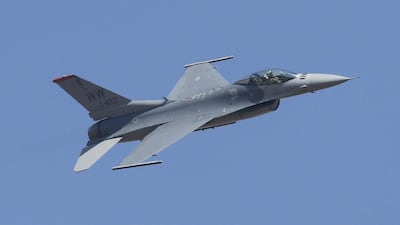US president Donald Trump’s administration has informed Congress of its plan to pursue the multibillion-dollar sale to Bahrain of 19 Lockheed Martin F-16 aircraft and related equipment, which was held up last year when the previous administration expressed concerns about human rights.
If finalised, the approval would allow Bahrain to purchase 19 of the jets, plus improvements to other jets in its fleet. Though Congress has opportunities to block the sale, it is unlikely to do so given the Republican majority’s strong support for the sale.
The US$4.867 billion (Dh17.87bn) deal includes the sale of aircraft, 23 engines, radars and other avionics, air-to-air and air-to-ground ordnance and related equipment.
The state department originally notified Congress of the sale last September during president Barack Obama’s administration. It was held back because of administration concerns that Bahrain had not made promised improvements to its human-rights record following a crackdown on protests in 2011.
The Trump administration’s decision to proceed with the deal is the latest signal that Washington is prioritising support for its allies in the Middle East to counter Iran’s attempts to expand its influence in the region.
US secretary of defence James Mattis was reported this week to have asked the White House to lift Obama-era restrictions on support for the Saudi-led coalition that is fighting Iran-backed rebels in Yemen. Gen Mattis is seeking to assist the coalition, which includes the UAE, in its plan to recapture the Red Sea port of Hodeidah, allowing the delivery of much-needed humanitarian aid and choking off supplies to the rebels.
The state department recently approved the sale of precision-guided munitions to Saudi Arabia in a deal worth about $390 million, reversing a decision last year to halt supplies over concerns about civilian casualties.
Recent reports suggest Tehran has been increasing military aid to support to the Houthi rebels in Yemen, including supplying them with drone technology and sending advisers to provide training and logistical support.
Iran is also involved in the conflict in Syria, where it supports president Bashar Al Assad, and is a key backer of Hizbollah, whose militia is fighting alongside Mr Al Assad’s forces.
Bahrain also accuses Iran of fomenting unrest among its majority Shiite population. A Bahraini court on Thursday found three people guilty of forming a terrorist cell and receiving Iranian funding aimed at destabilising the kingdom, a judicial source said.
The US state department has not commented on the Bahrain F-16 deal but the Senate’s foreign relations committee said it received notice on Wednesday of plans to proceed with the sale.
Committee chairman Bob Corker praised the move and said the caveats placed on the deal would have been “unprecedented and counterproductive” for security and human rights.
“There are more effective ways to seek changes in partner policies than publicly conditioning weapons transfers in this manner,” he said.
The notice triggers a 40-day “consultation” period in which committee staff can review a draft of the Bahrain approval, ask questions about the sale and raise any concerns. The state department will then send a formal notification to Congress, setting off a final, 30-day review period, during which legislators could pass a joint resolution or take other steps to stop the sale.
The notice was issued on the same day the commander of US forces in the Middle East, Gen Joseph Votel, told a House committee that foreign arms sales to allies should not be burdened with preconditions tied to human rights because they could damage military-to-military ties.
Gen Votel, who heads the US Central Command, singled out Bahrain as an example.
“While we have historically enjoyed a strong mil-to-mil relationship with our Bahraini counterparts, the slow progress on key FMS cases, specifically additional F-16 aircraft and upgrades to Bahrain’s existing F-16 fleet, due to concerns of potential human rights abuses in the country, continues to strain our relationship,” he said in testimony to the House armed services committee, referring to the Pentagon’s foreign military sales programme.
Bahrain is a key US partner in the Middle East, hosting the US navy’s Fifth Fleet headquarters and the Combined Maritime Forces, a US-led multinational naval partnership, in Manama.
The kingdom has also actively supported US-led military operations against ISIL in Syria since September 2014, primarily by allowing America continued use and access to its facilities.
Gen Votel said using military sales “to achieve changes in behaviour has questionable effectiveness and can have unintended consequences”.
“We need to carefully balance these concerns against our desired outcomes for US security assistance programmes,” he said, adding: “We should avoid using the programmes as a lever of influence or denial to our own detriment.”
* With reporting from Reuters and Bloomberg

